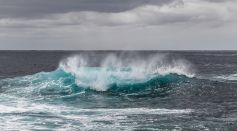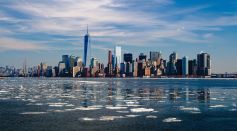Tags: Climate change

Climate Change Disrupting Ocean Stability Faster Than Previously Thought [Study]
Biodegradable Farming Alternatives May Answer Call to Resolve Plastic Content in Food

Climate Change and Erosion: How to Save the Earth from These Problems

Society Overhaul: UN Reports the Need to Change Society to Keep Nature Flourishing

Research Reveals How Climate Delayed Some Dinosaur Migration

Cities Around the World Are Sinking Because of Their Colossal Weight
Scientists Create Bendable Concrete and Carbon-Infused Cement Mixes to Curb Carbon Emissions

Study Suggests Climate Change Makes Allergy Sufferers’ Lives Worse
23-Year Data Reveals How High-Latitude Lakes Respond To Climate Change

Expert Explains the Reason Phoenix May Be Uninhabitable by the End of the Century
Scientists Uncover the Mystery Behind the Massive Craters in Siberia
World's Richest Person Elon Musk Is Offering $100M Prize for Best Carbon Capture Technology
Newly Discovered Mosquito on Guantanamo Bay: A Revelation of How Globalization Threatens Another Pandemic

Earth Considered 2020 as Second Warmest Year on Record, NOAA Says

Is The Polar Vortex Collapsing? Here's What It Means According to Experts
Cities are Turned Into Ovens Because of Climate Change

Carbon Sinks Can Help Stop Climate Change

How to Reduce Carbon Footprint: Easy Ways to Fight Climate Change on 2021

Researchers Devise A Novel Method of Producing Carbon Spheres
Climate Change Continues to Harm Kashmir's Famed Saffron Fields
Most Popular

10 Weird Things the Human Body Does—and the Science Behind These Biological Mysteries

Top Space Technology Trends and Aerospace Innovations Revolutionizing the World Today

Why Mega Typhoons Keep Getting Stronger: The Science Behind Typhoon Formation and Extreme Weather

How Plate Tectonics Trigger Earth's Most Dangerous Disasters Through Powerful Seismic Hazards





